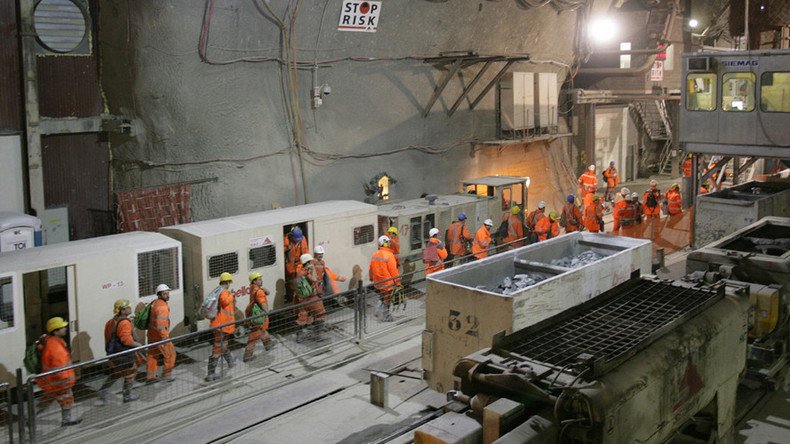Swiss don’t want Italians to ‘steal’ their jobs, referendum shows

A southern Swiss canton where over 60,000 Italians come across the border for work has voted to force companies in the area to give preferences to local workers. The so-called ‘frontalieri’ are accused by the Swiss of driving down wages.
The canton of Ticino is comprised of land that Switzerland annexed from Italian city-states in the 15th century and has kept close ties with Italy. Italian remains its only official language and Italians are the largest group of foreigners living in Ticino.
A campaign launched by the nationalist ultra-conservative Swiss People’s Party (SVP) has targeted Italian guest workers who commute across the border to work for Swiss companies, and then return in the evening to lower living costs in Italy. The number of such workers, called ‘frontalieri’, is over 62,000, compared to the 350,000 population of Ticino.
The SVP argued that frontalieri were effectively stealing jobs from the Swiss and driving wages down, while not spending the money they earned to boost the canton's economy. The party suggested that local businesses should not hire foreigners for positions that Swiss residents were prepared to take.
In a referendum on Sunday, the SVP's initiative won 58 percent of votes, creating a challenge for the local government, which is bound to follow the terms of bilateral treatments signed by Switzerland with other European countries that regulate free movement of labor.
Following the Sunday vote, authorities in Ticino warned it would be difficult to apply the referendum results, due to a “harmonization problem especially in relation to the federal laws, which our canton is obliged to respect,” The Local reported.
Swiss media also stressed that for Ticino to change its constitution, the canton would need approval from Bern, which could prove difficult.
The Ticino referendum “will have no practical effect immediately. But without free movement of people the Swiss-EU relations are in at risk,” noted Italian Foreign Minister Paolo Gentiloni on his Twitter page.
The vote in the southern canton is a reminder to the Swiss government, which has until 2017 to implement a February 2014 referendum held by the entire country. The federal vote, which was also proposed by the SVP, aimed to limit immigration from EU members by imposing quotas, which goes against the free-movement set by Switzerland's bilateral agreements with the bloc.
#Ticino Referendum anti frontalieri non ha per ora effetti pratici Ma senza libera circolazione delle persone rapporti Svizzera-UE a rischio
— Paolo Gentiloni (@PaoloGentiloni) September 25, 2016
Among Swiss cantons, Ticino was the strongest supporter of restrictions during the 2014 referendum, with 68.2 percent of votes in favor, compared with 50.3 percent across Switzerland.
Unemployment in Ticino stood at 3.2 percent in August, slightly higher than the 3.1 percent average for Switzerland overall, according to the Swiss economy ministry.
Paolo Beltraminelli, president of the Ticino government, said the 10 percent point difference between the two votes was due to his government's campaigning against this year's initiative.
The EU is currently negotiating with Switzerland on how the country will act on the 2014 vote, the Financial Times reported. Brussels is reluctant to offer concessions, fearing that it would be taken as a sign of weakness by London, which is in the process of leaving the EU and would have to renegotiate the terms of labor movement with the union.
Last week, Swiss MPs indicated that they may implement measures that would encourage domestic hiring rather than impose strict immigration quotas. The proposed compromise may be debated in December.













